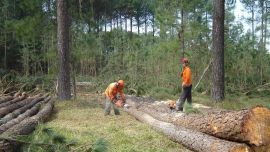When asked about balancing sustainability with economic growth, Sweden’s ambassador to Argentina’s response seemed to take the crowd of business leaders and government officials by surprise: “It’s really not that complicated.”
An audible, collective gasp softly reverberated throughout the auditorium as Ambassador Anders Carlsson ticked through the methods his country has employed to chase this harmony — carbon tax, transition to renewable energy, financially incentivising companies who go green.
Heads nodded silently in agreement. “Well, your government has to have money to do that,” one gentlemen in the audience chuckled under his breath.
Argentina’s economic statistics currently read like a near-flatlining heart rate monitor. According to the INDEC national statistics bureau, the rate of inflation in September was 5.9 percent, bringing total price increases over the last 12 months to a staggering 53.5 percent. The poverty rates has hit 35 percent, unemployment has risen to 10.6 percent and the IMF predicts the country’s economy will contract by 3.1 percent in 2019.
More uncertainty looms with the upcoming elections on October 27. Voters will choose between President Mauricio Macri, considered pro-business and international investment, and Alberto Fernández, who teamed up with former president Cristina Fernández de Kirchner, known for her more interventionist and isolationist policies when in office.
Given these dire straits, the question at Usina del Arte cultural centre on Friday — how Argentina can achieve the United Nations Sustainable Development Agenda goals by 2030 — at times felt aspirational, though a few key themes did emerge that may serve as eventual guideposts.
Collaboration
The program was comprised of a series of panels. Corporate representatives — mostly South American executives at companies based in one of the four Nordic countries — and government officials discussed their perspectives on transportation, energy, quality of life and construction.
One focus was the essential collaboration between public and private sectors. “The city of Buenos Aires can’t work alone. It needs the help of companies like these,” said Esteban Galuzzi, the City government’s sub-secretary of transit and transportation, as he discussed the challenges of transitioning public transportation in the capital to a safe, efficient and green system.
The business community echoed these sentiments. “We know we are part of the problem and we want to be part of the solution as well,” said Adriano Merigli, CEO of Volvo Trucks and Buses Argentina.
Future of work
Discussions repeatedly returned to the future of work. Denmark’s Ambassador to Argentina Søren Vøhtz noted the change he’s seen among the youth in his home country. “Young people are working, but they don’t just want a job. They want a mission,” he said. “They’re thinking ‘what’s my small part in saving the world?”
Kirsi Vanamo-Santacruz, Finland’s ambassador to Argentina, concurred. “Companies understand these goals aren’t just a business advantage, they’re an obligation. Consumers want their companies to be sustainable.”
According to Gabriela Agosto, executive secretary of Argentina’s National Council for the Coordination of Social Policy, while this cultural shift has started in the country, it hasn’t yet fully transpired. She cited the need for government to actively invest in spreading environmental awareness to the younger generations and educate them on personal and social health. “This transcends politics or policy,” she said.
Though agreed on the fact that it’s changing, businesses operating in Argentina have a slightly different approach to the future of work question. Companies like Equinor are focusing on family leave and investing in future talent with a background in STEM; MovilUno is playing with distribution of working hours; and ODFJELL Terminals is hosting “safety” days to promote community engagement and overall well being.
Climate change
Finally, concerns over climate change were echoed in nearly every individual’s answer and described by many as the principal global threat. “We have a vital role to help fight [it],” said Omar Bulnes, general manager and managing director for South America at Grunfos.
It wasn’t all just wonky policy talk, though. Bulnes energised the crowd with a rousing comment: “We have to ask ourselves, when we’re done here, do we want to retire a little richer businessman or do we want to have helped save this world?”
by Carly Graf, The Buenos Aires Times






















Comments